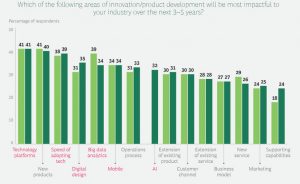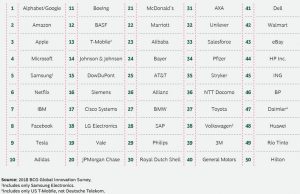This article is a chapter from the BCG report, The Most Innovative Companies 2019: The Rise of AI, Platforms, and Ecosystems.
Users of Google’s email software recently discovered that Gmail was offering to finish their sentences for them. This new Smart Compose feature relies on Google’s expertise in artificial intelligence (AI) and machine learning (ML), along with billions of training examples and the company’s cloud-based Tensor Processing technology, to intuit what Gmail users want to say—often faster than the users can complete their own thoughts.
In a world where computers can compose notes to your friends, it’s hardly surprising that the theme of BCG’s 13th annual global innovation survey and report is the rising importance of AI and of platforms that support innovation. This is not an out-of-the-blue development. Our last few reports have highlighted the crucial role of science and technology in innovation, the impact of digital technologies on both digital natives and more traditional industries, and strong innovators’ increasing use of various internal and external vehicles to uncover new ideas. This year’s survey shows that AI use is rapidly expanding and that many companies are relying more on platforms and their cousin, ecosystems, to support their innovations efforts.
[…]
Two New Forces
Most companies are at least exploring the use of AI, and strong innovators are seeing positive results. Nine out of ten respondents in our current survey say that their companies are investing in AI, and more than 30% expect AI to have the greatest impact of any innovation area on their industry over the next three to five years. (See Exhibit 2.) Four in ten self-described strong innovators report receiving more than 15% of their sales from AI-enabled products, compared with less than one in ten weak innovators. In a companion article, we take an in-depth look at the widening gap in where and how AI is affecting innovation. (See the companion article “AI Powers a New Innovation Machine.”)
Platforms and ecosystems serve multiple functions, including facilitating (and sometimes profiting from) the innovation of others, expanding reach and collaboration, and enabling new multiparty solutions and offerings. Again, strong innovators are more likely than weak ones to expect a significant impact within three to five years and to be actively targeting these areas. (See Exhibit 3.) Strong innovators also show other signs of being focused on external innovation. For example 75% report using incubators, 81% leverage academic partnerships, and 83% partner with other companies. Weak innovators lag consistently in all of these areas.
Platforms are technologies that provide a foundation for developing other business offerings. Numerous industrial goods companies, including Siemens (number 16) and Boeing (number 11), have built substantial platform businesses in predictive maintenance to complement their traditional engineering and manufacturing endeavors. Amazon, Microsoft, and IBM, among others, offer a range of software and services from their cloud platforms.
Ecosystems go a step further and leverage a range of partners that pull together the underlying technologies, applications, software platforms, and services needed to produce an integrated solution. (See “The Emerging Art of Ecosystem Management,” BCG article, January 2019.) The two main mobile operating systems—Google’s Android and Apple’s iOS—have grown into complex ecosystems of telcos, device manufacturers, service providers, and app developers, among others. Rapidly changing technologies and growing customer demand for a highly customized user experience further amplify the need for partnerships.
The opportunity to innovate entirely new revenue streams, business models, and sources of continuing advantage is particularly strong for B2B businesses, thanks to the masses of data that devices connected to the Internet of Things (IoT) generate. Data ecosystems will play a critical role in defining the future of competition in many B2B industries. (See “How IoT Data Ecosystems Will Transform B2B Competition,” BCG article, July 2018.)
Authors: Michael Ringel, Senior Partner & Managing Director, Boston; Florian Grassl, Partner & Managing Director, Munich; Ramón Baeza, Senior Partner & Managing Director, Madrid
More: www.bcg.com

